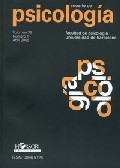Children left behind during immigration: Repercussions on the mental health of Latin-American mothers and fathers*
Paraules clau:
immigration, mental health, children left behind, gender differences, Latin-American mothers and fathers, inmigración, salud mental, emigrar sin los hijos, diferencias de género, madres y padres latinoamericanosResum
Emigrating and having to leave children behind may be a risk factor for the mental health of immigrants. This study aimed to compare the psychological symptoms reported by immigrant mothers and fathers who took their children with them with those who left their children behind. The sample comprised 213 Latin American immigrants (123 women and 90 men). The results showed that mothers who did not have their children with them reported more psychological symptoms than those who did. Few differences were observed in the case of fathers, except that those who had their children with them reported more symptoms related with somatization. After controlling for possible confounding variables (‘time since immigration’, ‘having a job’, ‘legal status’ and ‘social support’) it is concluded that for mothers not being accompanied by one’s children explains the largest proportion of the psychological symptoms analyzed, although the time since immigration also accounts for some of the variance in the case of depressive symptomatology and general distress. It is likely that the despair and frustration felt by mothers grows as time goes on and they remain unable to reunite the family. These results may be useful in terms of designing prevention and intervention programs with immigrant mothers.Descàrregues
Publicades
2012-02-10
Número
Secció
Articles
Llicència
El/la autor/a que publica en esta revista está de acuerdo con los términos siguientes:
El/la autor/a cede en exclusiva todos los derechos de propiedad intelectual al/la editor/a para todo el mundo y toda la duración de los derechos de propiedad intelectual vigentes aplicables.
El/la autor/a puede difundir una copia de sus artículos respetando la política de acceso libre de la revista.


